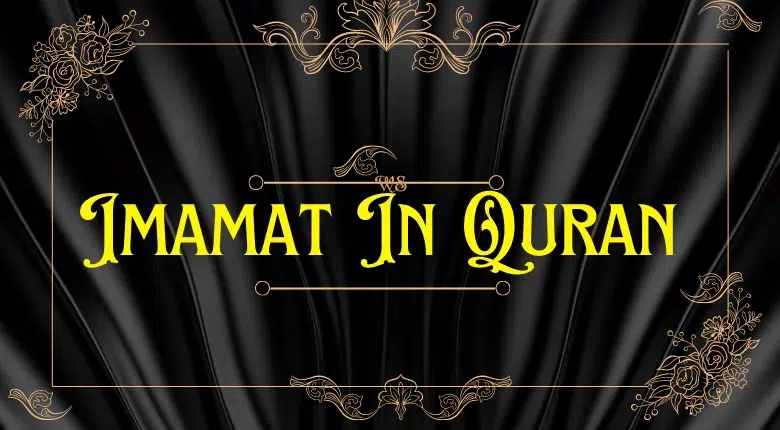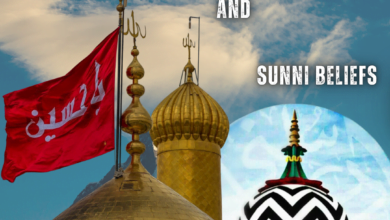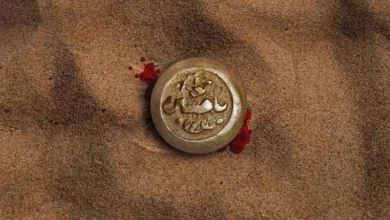True Belief Of Imamat in the Quran:What is Imamat?

“Today I have perfected your religion and completed my favor to you and have chosen Islam for you as a religion”
It is said that internal and external evidence showed that, as reported by the Shia and Sunnis, it was revealed in connection with the Ghadeer al-Khum event.
We’ll mention two or three additional Quranic passages to clarify the Shi’ah arguments concerning Imamat. One of these passages is a Surah al-Maidah verse 60 verses after the aforementioned verse. It reads:
“0 Messenger! Make public that which has been revealed to you from your Lord, for if you do not, you will not have communicated His message” (5:67).
Preliminary comments are needed to comprehend this and the prior verse. The Prophet’s Progeny Verses’ Special Position
The Qur’anic passages on the Prophet’s descendants, notably those about Imam Ali from our Shi’ah perspective, have a peculiar language. Though these passages contain adequate internal evidence to suggest what they mean, they are positioned between verses on different topics. Thus, their significance must be sought. Muhammad Taqi Shari’ati’s Imamat and Khilafat address this unique aspect well. He may have been the first to discuss this in Persian. This feature also answers why Imam Ali’s name isn’t mentioned in the Qur’an.
Tatheer (Purification) Verse
“People of the home, Allah desires to eliminate all types of uncleanliness from you and to purify you fully,” reads the Tathir verse. Al-Ahzab 33:33
Allah-specified cleansing is meant here. No conventional or medical cleaning. Not intended. It removes all doctrinal, moral, and practical faults, which the Qur’an calls rijs or rujz. This passage implies that the Prophet’s Household is infallible and above all impurities.
We find this verse in the Qur’an, and when we look at Islamic history and Muslim traditions, we find that not only the Shi’ah, who are partisans and followers of the Prophet’s progeny, but even the members of that sect that is not special supporter of the Prophet’s progeny, state in their most authentic books that it refers to Imam Ali, Fatimah Zahra’, Imam Hasan, Imam Husayn, and Umm Salamah, one of the Holy Prophet’s wives, asked him if this passage applied to her when it was revealed, according to Sunni tradition. The Holy Prophet said she was blessed but not in the passage. This tradition is repeated by other authorities. Sunni books report this.
This passage is jumbled with others about the Holy Prophet’s wives. “0 you wives of the Prophet! You are not like any other woman. (Of course, the verse does not mean to say that the Prophet’s wives are superior to other women.) 0 you wives of the Prophet! Whosoever of you commits a sin, the punishment for her will be doubled.
The punishment will be doubled because she not only commits that particular sin but also violates the sanctity of her husband and is guilty of sacrilege. Similarly, “Whosoever of you is submissive to Allah and His messenger and does right, We shall give her double reward”. She will be doubly rewarded because a virtuous act of hers actually consists of two acts.
This case is similar to that of the Sayyids who are said to be doubly rewarded for their good deeds and doubly punished for their evil ones. That is not because a sin committed by them is different from that committed by others, but is due to the fact that their sin is twofold.
For example, if a sayyid, God forbid, drinks wine, he besides committing that sin, is guilty of sacrilege also, for he is a descendant of the Holy Prophet, and any person who sees him acting openly against the Holy Prophet’s teachings, gets a very wrong impression of Islam.
In these verses, all the pronouns are of the feminine gender. O you wives of the Prophet! You are not like any other woman if you have fear of Allah. Obviously, the wives of the Holy Prophet are being addressed here.
After two or three verses the pronouns suddenly change into the masculine gender and we arrive at this verse: People of the house, Allah wants to remove all kinds of uncleanliness from you and to purify you thoroughly. Then again the feminine pronouns are used twice. The Qur’an does not do anything haphazardly. In this verse, we notice two changes. Firstly here the expression, People of the House has been used, whereas previously the Wives of the Prophet were addressed all along. Secondly, the feminine pronouns have been replaced by the masculine pronouns.
These changes are not without a reason. Actually, this verse deals with a subject different from that which was dealt with by the previous verses. The verses preceding and following this verse prescribe certain duties for the wives of the Holy Prophet and inter alia imply threat, fear, hope, and command. Addressing them the Quran says:
“And stay in your houses and do not display your embellishments in a pre-Islamic way.” (Surah al-Ahzab, 33:33)
This passage of the Quran implies fear and hope. The Holy Prophet’s wives were told that if they behaved well, such and such would happen, but if they behaved differently, the results would be different.
This verse, that is the verse of tathir or purification is more than a simple eulogy. It signifies that the members of the Prophet’s progeny are infallible and free from every sin and error. It is an independent statement and has no connection with the verses preceding and following it.
Those verses were addressed to the Holy Prophet’s wives, and this verse is addressed to the ‘People of the Prophet’s progeny’. In those verses, the feminine pronouns were used, but in this verse the pronouns are masculine.
Anyhow, this verse which has no connection with the verses preceding or following it, has been inserted into the midst of them. It may be called a parenthetical sentence. We all know that sometimes it happens that a speaker speaking on a subject makes a sudden digression and then again resumes the subject on which he was speaking.
That is why our Imams have emphatically stated that it is possible that some verses of the Qur’an deal with one subject in the beginning, with another in the middle, and with a third in the end. A great deal of stress has been laid on this point in connection with the interpretation of the Quran.
Our traditions, Imams, and all Sunni sources agree that this verse is unrelated to the verses before and after it and addresses a separate topic.
“On this day I have completed your faith.” (Surah al-Ma’idah, 5:3)
“The beast of cattle is made lawful to you,” says the passage before this one. …..Carrion, blood, swine flesh, and anything committed to anybody other than Allah are forbidden. …Surah al-Ma’idah 5:1-2
“Today the disbelievers have despaired of damaging your faith,” we read. “Today I have perfected your religion, finished My favor on you, and selected Islam as your religion.” (Surah al-Ma’ida, 5:3)
Then the theme which was discussed earlier, is once again resumed. Basically, these two verses are not in keeping with the verses preceding or following them. Evidently, they have been inserted in the midst of the verses dealing with a totally different point. The same was the case with the verse we were just talking about.
We find that it was inserted between other verses in such a way that if it was removed, the other verses would not get disjointed. Similarly if the verse. On this day I have completed . . . . . is taken out, the harmonious flow of the verses preceding and following it will not be disturbed. It is a verse inserted in the midst of other verses in such a way that it is neither a tail-piece of the verse preceding it nor a prelude to the verse following it. It deals with an entirely different subject.
The internal indications of the verse itself as well as the reports of the Shi’ah and Sunni sources, all support the view that it is an independent verse. But why has this verse after all been inserted in between the verses with which it does not have any connection? There must be some reason for that and a good reason too.
Reason Of Imamat
The reason to which our Imams also have alluded can be inferred from the Quran itself. Hence, out of all Islamic precepts, the divine commands, relating to the special position of the Holy Prophet’s progeny and the question of Imam Ali’s Imamat, had the least chance of being implemented.
Owing to their deep-rooted prejudices the Arabs seemed to be the least prepared to accept these ideas. Although the Holy Prophet had received Divine instructions regarding Imam Ali, he apprehended that if he made them known, he would be accused of nepotism by the hypocrites mentioned in the Qur’an, in spite of the fact that he never gave preference to himself over others.
In keeping with the Islamic teachings it was his habit not to make any discrimination, and this quality of his was a very important factor in his success. To proclaim Imam Ali as his successor was a Divine command, but he knew that the people of weak faith would as usual say that he wanted to distinguish himself.
We have seen that in the above verse, the words on this day I have perfected your religion, were preceded by the words, this day the disbelievers are in despair of ever harming your religion; so fear them not and fear Me. What is meant is that the disbelievers have lost every hope of their success against Islam, and so fear them not and fear me.
As pointed out earlier, it is a Divine way of Allah to withdraw His bounties and favors, from those whose inner condition goes bad. Such people may be deprived of even Islam, which is also a Divine favor. To say: fear Me is a way of saying: fear yourselves. In other words, the Muslims no longer faced any external danger, but they were threatened by an internal one.
This passage is from Surah al-Ma’ida, the last surah given to the Holy Prophet, and it was revealed during the last two or three months of his life when Islam had gained a lot of influence.
Another verse, “Messenger! If you don’t, it’s like you didn’t deliver My message. (Surah al-Maida 5:67)
It may be mentioned that in the Qur’an there is no other verse urging the Holy Prophet to undertake a particular task. It appears from the tone of this verse as if somebody was being impelled to do a thing, but he was wavering. In this verse the Holy Prophet is being asked to make known what has been revealed to him.
He is also being threatened that if he did not do so, he would be regarded to have failed in his apostleship. At the same time, he is being assured that he will be protected and therefore he need not have any fear.
In the previous verse, the Muslims were told not to fear the disbelievers. As such the Holy Prophet could not be expected to have any fear of them. But this verse shows that he was still apprehensive and uneasy about something. Naturally, he could not be afraid of the disbelievers, he was actually only conscious of the danger of turmoil on the part of those who were not willing to accept Imam Ali’s succession.
I cannot say whether these people were also disbelievers in their hearts, but somehow they were unable to swallow the idea of Imam Ali’s Imamat.
Historic Proof Of Imamat
Umar said, “We did not elect Ali as a precautionary measure in the interest of Islam.” The Quraysh could not tolerate Imam Ali, so they rejected him.
He meant that Prophethood had given Bani Hashim a distinction. If Khilafat is in that family, all distinctions belong to one house. That’s why Quraysh hated Imam Ali’s Imamat. Ibn Abbas refuted Umar with several Quranic passages.
The Qur’an and Umar seem to have expressed the same predicament in Muslim culture. According to a narrative, Imam Ali was unfit to be Caliph since he murdered so many notable Arabs in Islam’s wars.
The Arabs are naturally malignant, therefore the families of those he killed still hated Imam Ali after converting to Islam. Some Sunnis argue that Imam Ali was more qualified but not picked because he had many adversaries.
Thus, the Holy Prophet’s period was tense, and a revolution against Imam Ali’s ascension was expected. Perhaps that is why the Qur’an has mentioned the question of Imamat in these verses in such a way that every unbiased man could understand their significance, but it has avoided putting this question in a way that its rejected by those who were bent on rejecting it could become a revolt against Islam and the Qur’an.
The Quran has permitted opponents to hide their rejection. The Tatheer passage was included among other verses for the same reason. But any reasonable and honest person may understand its true meaning and recognize it as an independent verse. The verses On this day I have finished your faith and Messenger! Share your Lord’s revelation.
Your Guardian is Only Allah…
Other relevant poems are thought-provoking. They make people think these passages have a specific significance that can only be understood by continual reports. “Your protector is only Allah, His Messenger, and those who believe, establish prayers, and pay the zakat when they are kneeling in prayer” (Surah al-Ma’ida, 5:55).
Zakat is seldom paid while bowing. Thus, this has not been mentioned generally. Thus, this verse relates to a specific incident, but it hints at it in a way that denies it as a revolt against the Qur’an. Every unbiased individual may readily conclude that the poem alludes to a strange incident. Zakat-paying bowers are unusual. It suggests a random incident. What happened? The Shi’ah and Sunnis agree that Imam Ali revealed this passage.
Gnostics Say?
Other verses only make sense after careful thought. That’s why gnostics have long argued that Imamat and Wilayat are Islamic law’s inner sides. Shi’ahs agree. Thus, gnostics put it effectively. To grasp the Imamat issue, one must penetrate the husk to access the kernel, since it needs serious thought. Only those with this gift may comprehend this inquiry. They encourage others to explore this subject. Not all reply. To understand the Shia rationale, we’ll examine another passage.
We are examining a Quranic passage. The amazing verse is about the notion of Imamat, not Imam Ali. As said, Muslim scholastic theologians often debate Imamat as though the Shia and Sunnis share the same notion but disagree on its circumstances.
Sunnis disagree with Shia that an Imam must be infallible and chosen by Divine mandate. Sunnis don’t believe in the Shi’a’s Imamat. Sunnis only believe in the worldly Imamat and one of its roles. The Holy Prophet led the Muslim community, but he also administered the state as a Prophet. Leadership does not imply prophethood.
Prophethood is multifaceted. A Prophet is the only Muslim leader in his presence. Sunnis believe that Imamat is just government management and that an Imam is a Muslim monarch. Muslims elect him. Sunni Imams are only Muslim state leaders. However, the Shi’ah believe that Imamat is identical to Prophethood and even greater. Imam-Prophets rank highest. Many Prophets weren’t Imams. Even the highest-ranking Prophets received Imamat after being Prophets.
In summary, if we accept that Imamat is like Prophethood, we must also accept that, just as in the presence of a superhuman Prophet, the question of who should reign does not arise, so too in the presence of an Imam.
This question only occurs when there is no Imamat either because there is no Imam or because the Imam is under occultation, like in our day. We shouldn’t confuse Imamat with administration and ask Sunnis and Shi’ah about it. Government is separate from Imamat. The Shi’ah believe Imamat is a phenomenon like Prophethood but at the ultimate level. Shi’ah believes in Imamat, but Sunnis don’t. They believe in it, but their Imam requirements differ.
Prophet Ibrahim’s Progeny Imam
The Shi’ah believe in Imamat, as seen in this scripture. The Shi’ah believe this verse proves that Imamat has existed since the Prophets’ first appearance and will continue to exist until the Day of Resurrection. “And (remember) when his Lord tried Ibrahim with His orders, and he followed them, He said: I have appointed you an Imam for humanity. Ibrahim said: And of my offspring? He said: My covenant includes not the unjust” (Surah al Baqarah, 11:124).
Prophet Ibrahim’s Trials—Migrate to Hijaz
The Qur’an mentions Prophet Ibrahim’s tribulations. His fight against Namrud and his thugs, who tossed him into a fire, and other incidents followed. Ibrahim got a shocking order that only a totally devout Muslim could follow.
He was childless. At 78, Hagar had her first child. Prophet Ibrahim is ordered to travel from Syria to Hijaz, take his wife and kid to Masjidul Haram, and leave. Only full self-submission and devotion could justify this mandate. He obeyed because he believed it was a revelation from God. “Our Lord: I have established some of my posterity in an uncultivable valley near Your Holy House so that they may establish prayers” (Surah Ibrahim, 14:37).
Execute His Son
Prophet Ibrahim’s son’s slaughter at Mina is more shocking. We sacrifice goats and animals to honor this astounding self-surrender. After witnessing two or three dreams about sacrificing his kid, Ibrahim was certain that Allah had ordered him to do so. He informed his son. Father, obey. I’ll be firm, Allah willing. Qur’an imagery is beautiful. After they submitted to Allah and he threw him in his face. We told Ibrahim, “Ibrahim, you have already completed the vision” (Surah as-Saffat, 37:102-105). Allah says He didn’t want Isma’il’s head chopped off. He simply wanted Ibrahim and Isma’il to fully submit to Him, which they did.
The Quran states that Allah granted Prophet Ibrahim a son in old age. His wife said:
“Shall I bear a child when I am an old woman and this my husband is an old man?” (Surah Hud, 11:72-73) Allah gave Ibrahim a child when he was old. He had no children when young. He had a child as a Prophet. Many Qur’an verses mention Ibrahim. He had a child in his 70s or 80s. He lived another fifteen or twenty years, raising Ishaq and Isma’il. Isma’il matures to assist his father build the Ka’bah.
“And (remember) when his Lord tried Ibrahim with his orders, and he followed them. He said: I have appointed you an Imam for humanity. Ibrahim said: And of my offspring? He said: My covenant includes not wrong-doers.” (Surah al-Baqarah, 2:124)
When did Ibrahim live these verses? They from his youth?
Since they mention a revelation, they allude to his prophetic existence. They also relate to Prophet Ibrahim’s latter years since they discuss his tribulations. These hardships spanned his life, with the most significant occurring in his later years. These lines also name his children. That implies he had a child at the time.
This Quran states: I have created you an Imam for mankind. He received a new task. He was already a Prophet and Messenger of Allah. He wasn’t there yet. After all the trials, he got it. Does it not prove that Imamat is a Quranic reality? It’s meaning?
Divine Covenant: Imamat
Imamat is becoming a flawless man and leader of others. Ibrahim remarked, “What about my offspring?” after becoming an Imam. My heirs? He was told: My covenant excludes wrongdoers.
Allah’s covenant is Imamat. That’s why Shi’ah claim their Imamat is Divine. The Qur’an calls it “My covenant”. Allah’s covenant, not people’s. Imamat is a Divine appointment since it is distinct from Muslim communal guardianship. Who will set it up?
Government, Allah, or people? Government differs from Imamat. Allah tells Ibrahim: Imamat is My promise and will not include the naughty kids. Allah neither answers Prophet Ibrahim’s query. He excludes wrongdoers from Imamat. Only Ibrahim’s non-wrongdoers survived. This passage proves Imamat would always exist among them.
“And He made it a word abiding in his generations” (Surah az-Zukhruf, 43:28)
It is another relevant verse.
Who does wrong?
Define a wrongdoer. The Imams (Peace be on them) have argued that this verse uses this phrase. The Qur’an considers all unjust people wrongdoers. Wrongdoers are those who violate others’ rights. However, the Qur’an calls him a self-injurious offender. Many Qur’anic passages brand self-transgressors as wrongdoers.
Allamah Tabataba’i reports one of his professors as saying that Prophet Ibrahim’s descendants may be categorized into four good or evil categories in response to his inquiry concerning his offspring:
(i) Criminals;
(ii) Wrongdoers who became good;
(iii) Noble people who turned evil;
(iv) Never-wrongdoers.
After a long time as a Prophet, Prophet Ibrahim realized the gravity of his exalted position of Imamat. He would never ask this for his descendants who were bad throughout their lives or who were nice at beginning but became evil. Prophet Ibrahim must have requested this status for decent people. Thus, his good descendants comprised those who were always good and those who started out bad but turned good.
He could not have asked for this post for anyone outside these two groups. Now we see that the Holy Qur’an says: “My covenant does not include those who have been wrongdoers.” Ibrahim’s question did not include those who had been wrongdoers throughout their life or those who had been good in the beginning but turned bad later on. Thus, the Qur’an implies that unrepentant sinners will not get Imamat.
The Shia claim that polytheists cannot occupy Imamat.
The Quran attributes disobedience to various Prophets.
“Adam defied his Lord and went astray.” (Surah Taha, 20:121)
“So that Allah may forgive you of your sin, that which is gone and that which is to come,” Allah tells the Holy Prophet (Surah al Fath 48:2).
These passages demonstrate relative infallibility. We are infallible to the extent that the Prophets and Imams are. Infallibility prevents sin. One’s faith level determines this protection’s extent. A man is as close to “if it had not been that he saw the reasoning of his Lord” as his faith is faultless. Automatically infallible. An infallible person does not want to sin, but Allah sends someone to hold his hand and stop him. That would have made myself and Imam Ali identical. He wanted to transgress too.
He would have been prevented from committing them by an Allah-sent person, but I have no such arrangement. If someone else stops a guy from sinning, that is not his fault. Suppose someone stole, but I didn’t since a watchman was constantly with me. I am as excellent a thief as that man, but a watchman stopped me. No credit to me.
Infallibility depends on sinlessness. Mistake-proofing is different. However, we cannot argue that the Holy Prophet may have misinterpreted the Islamic laws or imparted anything opposite to what was revealed to him, as happens with regular messengers. The Holy Prophet could not have erred in his message delivery.
The questioner jumped to conclusions on other questions. He wronged Imam Ali. Is he convinced that Imam Ali would not have chosen Ubaydullah ibn Abbas? Historical speculation is OK. Anyone can suggest that instead of doing that 500 years ago, such-and-such should have done this. He may pretend he was guessing if questioned.
However, it is risky to reach a decision on such issues, both for Imam Ali and others. Imam Ali knew the situation. He knew Abdullah ibn Abbas and his colleagues better than us. However, if he had chosen someone other than Abdullah ibn Abbas, he would have done better. This conclusion is premature. You’ve also said that Imam Ali had his own policy and wouldn’t compromise. His policy has no backers.
He always maintained he had no man. Abdullah ibn Abbas and others encouraged him to be flexible. Diplomacy was advised. Show me that Imam Ali had enough guys to pick from but made a mistake. I cannot show that.
I only know the Holy Prophet named Imam Ali his successor. Imam Ali lamented his Khilafat loss. After Uthman, Imam Ali said, “Leave me alone and seek someone else, for we are facing a many-sided situation.
The atmosphere is overcast and the route has changed beyond recognition.” He meant that the conditions were very bad and he needed supporters and workers to improve them and reform society. “Still I have no excuse. If I make an excuse, history will not accept it. People will say that Ali through his own negligence lost the opportunity.
Though in fact, it is not an opportunity. I accept your suggestion so that history may not blame me,” he said, admitting that he did not have enough men and that the time was not right for his Caliphate.
History doesn’t question Imam Ali’s claim to Khilafat. Sunnis acknowledge that Imam Ali thought himself a better Khilafat candidate than Abu Bakr and Umar. After Uthman, many wanted him to embrace Khilafat, but he rejected it, saying he preferred to advise and lead. This shows he lacked capable men. So why? Different question.
You assert that zakat is not owed on a ring, yet zakat embraces all good deeds. Jurists use it as a technical word for required zakat. The Qur’an doesn’t always use this term. Zakat purifies wealth. Spiritual cleansing uses this term. The Qur’an calls spending for Allah Zakat of wealth, soul, and self. “Sadaqah”—charity alms—is the same. It’s exceptional today.
The Qur’an calls all beneficial deeds sadaqah, including hidden ones. The Qur’an calls building a hospital or writing a helpful book sadaqah jariyah (running charity). That’s why Sunnis who disagree with this verse’s interpretation haven’t objected to this term. Zakat is not always necessary, as they know from Arabic literature.
How did Imam Ali give his ring while praying? Early academics like Fakhruddin Razi objected. Ali was so focused on praying that he never saw what was going on around him. How might this happen during prayer? In response, it is true that Imam Ali was entirely engrossed in his prayers, but the state of the Holy Men changes.
The Holy Prophet was sometimes so driven to pray that he ordered Bilal to hurry up. While prostrating in prayer, Imam Hasan, Imam Husayn, or another grandchild regularly mounted his shoulders, and he waited quietly until the youngster went off. He took two steps ahead, covered the spittle with dust, and returned to his seat while praying. Jurists derived several prayer norms from this episode.
Bahrul Ulum said: “The most honorable individual walked while performing prayers. This incidence addresses many problems.”
Based on this instance, jurists determined how much non-prayer-related action is allowed during prayers. Deduced rules include others.
The Holy Men’s spiritual condition affects their behavior.
Another point. Gnostics believe that when a person fully attracts Allah, he returns to this world. He serves Allah and creation in this condition. Although many disagree, I agree with the Gnostics.
Disincarnating—leaving the body—is another spiritual condition. Those who achieve this level first leave their bodies for a few seconds or an hour. Some people stay in this state forever. (I believe it and have seen it.) Sometimes you may notice folks sitting with you who are in this state. These people believed that Imam Ali’s status when an arrow was taken out of him while he was praying was lower than when he ministered to a beggar without being mindful of Allah. Allah’s attention allowed him to perceive the world. The proof proves this occurrence.
This content is using references to the following book and writer.
- IMAMAT OF PROPHETS EXPLAINED IN THE QURAN
- IMAMAT OF BAD PEOPLE EXPLAINED IN THE QURAN
- IMAMAT OF THE GOOD AND BAD EXPLAINED IN THE QURAN
- IMAMAT OF THE DIVINE BOOK AND STRAIGHT PATH EXPLAINED IN THE QURAN
- IMAMAT OF THE HEAVENLY PRESERVED TABLET EXPLAINED IN THE QURAN
- HOW DOES IMAMAT BENEFIT US ON THE DAY OF JUDGMENT?
- EVERY NATION IS CALLED BY THEIR IMAM ON THE DAY OF JUDGEMENT
- WE WILL TAG ALONG WITH OUR IMAM ALL THE WAY TO PARADISE ON THE DAY OF JUDGEMENT
- THE DEEP ESSENCE OF IMAMAT IN THE QURAN
- HOW IS THE JOB OF PROPHETHOOD DIFFERENT TO IMAMAT IN THE QURAN?
- SOME PROPHETS ATTAINED THE STATUS AND RESPONSIBILITY OF IMAMAT
- IMAMAT IS INTRINSIC TO THE SURVIVAL OF SOCIETY




